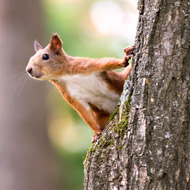25 Genomes Project to reveal 25 species

The project could show why red squirrels are vulnerable to squirrel pox.
The Wellcome Trust Sanger Institute and its collaborators are sequencing 25 new genomes of species in the UK.
The 25 Genomes Project could reveal insights into why some brown trout migrate to the open ocean, whilst others don’t. It could also show why red squirrels are vulnerable to squirrel pox, whilst grey squirrels can spread the disease without falling ill.
The results will be made available to the public and could lead to further studies to understand the biodiversity of the UK. The results will also aid conservation efforts and understanding of these species.
“Twenty-five years ago the field of genomics was a budding idea and its implications only dreamed of. Today the reality of genomics and biodata is that it is transforming our understanding, diagnosis, and treatment of diseases, ranging from cancer and heart disease to malaria and infections,” said Professor Sir Mike Stratton, director of the Wellcome Trust Sanger Institute.
"This project has come after many thoughtful conversations around the world with regard to how many of the species on our planet could be sequenced in the coming decades – in principle, all of them. We are embarking on our contribution to sequencing all life on Earth.”
The 25 species that will have their genomes sequenced include the grey squirrel, red squirrel, giant hogweed, golden eagle, brown trout and the common starfish. The species will be divided up into five categories depending on the qualities they share (Flourishing, floundering, dangerous, iconic and cryptic).
The project is a collaborative project involving many institutions including the Natural History Museum, London and The National Trust. Tim Littlewood, head of life sciences at the Natural History Museum said:
"The Natural History Museum is proud to be collaborating with the Sanger Institute to celebrate their 25th birthday and also to celebrate the advances that molecular techniques such as genome sequencing can bring to the study of UK wildlife.
“The 80 million specimens we care for, from around the world, hold a wealth of genetic information that enables us to conduct innovative research, addressing global challenges. A focus on UK biodiversity with cutting-edge technology is particularly welcome."



 The Veterinary Medicines Directorate (VMD) is inviting applications from veterinary students to attend a one-week extramural studies (EMS) placement in July 2026.
The Veterinary Medicines Directorate (VMD) is inviting applications from veterinary students to attend a one-week extramural studies (EMS) placement in July 2026.